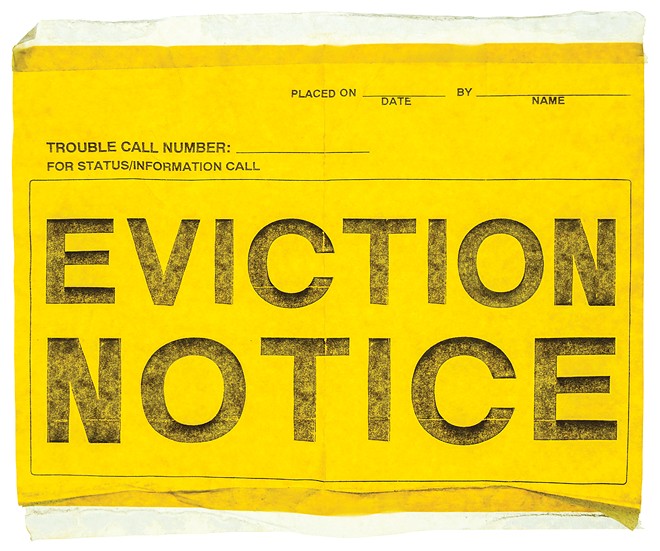A federal moratorium on evictions has tied landlords' hands and led to tenants simply refusing to pay rent. That's according to Stella Dean, a board member of the Springfield Area Landlord Association. Rental assistance has been made available and many Springfield-area tenants are availing themselves of it in cooperation with their landlords. But Dean said many other tenants do not qualify for rental assistance, or do not see the benefit if it will not cover all of their back rent.
Since early 2020, a federal moratorium on evictions, put in place by the U.S. Centers for Disease Control and Prevention, has banned evictions due to nonpayment by renters who are in "communities experiencing substantial or high transmission of COVID-19." By the National Low-Income Housing Coalition's estimate, that covers as many as 90% of all renters in the United States.
"It is never in the best interest of the landlords to evict a resident," Dean said. "It's our goal to set them up for success, not failure. We have many residents who are in agreements now, who are back-paying, and who will not get evicted."
And yet, as the moratorium was again extended through the beginning of October of this year, eviction cases are moving forward and tenants are being evicted in Sangamon County. The Sangamon County Circuit Clerk's office told Illinois Times that there were 1,400 eviction cases filed in 2019, compared to 738 in 2020. As of earlier this month, there have been more than 250 cases so far in 2021. The Circuit Clerk's office did not have figures on how many rulings resulted in eviction.
David Amerson, legal counsel for the Springfield chapter of the Illinois Police Benevolent and Protective Association and a founder of the Central Illinois Worker and Tenant Association group on Facebook, said many landlords are bringing forth eviction notices and court proceedings, and Sangamon County judges are putting them forward. Amerson has represented tenants in court.
"Any conscientious judge who has a subscription to a newspaper should delay that case or throw that case out because of the moratorium, but that is not what I saw," Amerson said. "Even when I took these cases to trial, they found ways to get around the moratoriums."
It's a situation that has resulted in an influx of calls from tenants for legal aid, said Michelle Davis, managing attorney for Land of Lincoln Legal Aid's East St. Louis-based referral center, which fields calls from 65 counties in Illinois, including Sangamon. Many cases are "self-help" evictions, Davis said – cases in which tenants allege a landlord is resorting to tactics such as turning off electricity or changing locks to attempt to drive tenants off a property in lieu of taking the matter to court. A hotline the referral has set up to field calls for tenants seeking legal aid in evictions cases receives as many as 60 calls per week, Davis said. That's about triple the amount it was receiving when the hotline first went online in April.
The number of self-help cases arising from allegations of landlord misconduct has also risen noticeably since 2019 based on Land of Lincoln Legal Aid's requests, Davis said. The office fielded 438 eviction-related calls during the period between March and June of 2019, 16 of which were self-help cases. In the 15 months since January 2019 and the beginning of the COVID-19 pandemic in March 2020, her office opened 54 self-help eviction cases. Over a 15-month period from April 2020 until June of 2021, her office opened 162 self-help cases, she said.
"I think some of the landlords, and not all courts, are honoring all aspects of the moratorium," Davis said. "As opposed to nonpayment of rent, [landlords] just became more creative on ways to bypass the moratorium."
Davis said the influx of calls her office received could also be the result, in part, of a concerted effort on the part of Land of Lincoln Legal Aid's efforts at reaching those seeking legal help during evictions processes.
For Sunni Deetz, the moratorium has for the moment kept her in her home. Deetz, 43, of Blue Mound, said her apartment was secured through a Section 8 public housing voucher. Deetz, a single mother to her school-aged daughters and a 25-year-old son with severe autism, said the combination of her child care duties and the danger the pandemic poses to her family have made securing employment difficult. She says she's grateful for the moratorium, which has put a stop to eviction proceedings for the time being.
All the same, Deetz said, conflicts with her landlord have been unbearable. "I am grateful and thankful, because of my kids, that we're able to stay somewhere and have a home. But it's still like going through hell."
Kenneth Lowe is a Springfield resident and a regular contributor to Paste Magazine.
This story has been updated to correct the job affiliation of David Amerson.

















